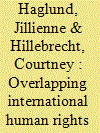|
|
|
Sort Order |
|
|
|
Items / Page
|
|
|
|
|
|
|
| Srl | Item |
| 1 |
ID:
175191


|
|
|
|
|
| Summary/Abstract |
How does the anticipation of external support for both opposition groups and governments affect the likelihood and form (violent vs. nonviolent) of uprising within states? We develop a novel approach to address these issues, building on a network perspective. Our model suggests that both opposition groups and governments’ strategies are affected by an anticipation of the degree and nature of expected support by external parties (states and non-state actors). Using a set of indicators – including cultural affinity, strategic factors, and normative values – we develop a unique measure of anticipated support based on the potential support networks of target states and their opposition in order to evaluate our hypotheses. We argue that the anticipated balance of support for opposition and governments affects: (a) the likelihood of uprising and (b) the principal – violent or nonviolent – strategy used by the opposition group. We analyze data on violent and nonviolent civil conflicts over the period 1946–2010. We find that when the balance of anticipated support favors the opposition over their target government, the onset of an uprising is more likely. Specifically, the type of anticipated support has implications for whether a violent or nonviolent uprising occurs. These findings provide new insights into the role external support can play even before conflict occurs.
|
|
|
|
|
|
|
|
|
|
|
|
|
|
|
|
| 2 |
ID:
175192


|
|
|
|
|
| Summary/Abstract |
With the proliferation of the international human rights regime, states confront a dense set of institutional commitments. Our knowledge of the influence of these commitments is limited for two reasons. First, scholars largely focus on the effect of treaty ratification on states’ human rights behavior, but states engage with these institutions after ratification via regional human rights court rulings and UN recommendations. Second, scholars often examine these institutions in isolation. The institutions do not operate in isolation, however, nor do states necessarily consider the requests they receive from these institutions independently. In this article, we introduce the Women’s Rights Recommendations Digital Database (WR2D2), which maps the various recommendations international women’s rights institutions make on European states. We begin by discussing the importance of recommendations from international institutions and their relationship with commitment and compliance. We then describe the data collection effort, including two dimensions on which recommendations made to European states vary – precision and action. Next, we report descriptive statistics from the dataset, including regional and temporal trends. We conclude with a discussion of the multifaceted research agenda that this new dataset can facilitate.
|
|
|
|
|
|
|
|
|
|
|
|
|
|
|
|
| 3 |
ID:
175190


|
|
|
|
|
| Summary/Abstract |
Does power-sharing promote peace? Relying on credible commitment theory, past research has predominantly focused on one aspect of this question – namely, whether power-sharing prevents the recurrence of battle violence between agreement signatories. However, this disregards a phenomenon that plagues postwar countries across the globe: battle violence perpetrated by armed groups outside of the negotiated settlement against the postwar order. To explain this violence, I argue that we have to focus on how power-sharing redistributes power and access to resources across elites in a postwar country. By determining who gets what, when, and how, power-sharing determines the state’s counterinsurgency capabilities and thus shapes incentives and constrains for extra-agreement battle violence. Personalized power-sharing, for instance, gives elites privileged access to state resources, facilitates effective counterinsurgency strategies, and thus decreases extra-agreement violence. In contrast, structural power-sharing limits elites’ access to resources and their ability to prevent armed challenges resulting in higher levels of violence. To empirically test these propositions, I combine data from the Power-Sharing Event Dataset (PSED) with the UCDP Georeferenced Event Dataset (GED) for peace agreements in Africa and Asia signed between 1989 and 2006. I analyze these data using count models, matching procedures, and correlated random effects models. The empirical results support my expectation that personalized power-sharing is associated with fewer extra-agreement battle-deaths while structural arrangements facilitate postwar rebellions. This study contributes to an improved understanding of power-sharing as a conflict resolution tool and highlights its divergent effects on actors inside and outside of peace agreements.
|
|
|
|
|
|
|
|
|
|
|
|
|
|
|
|
|
|
|
|
|